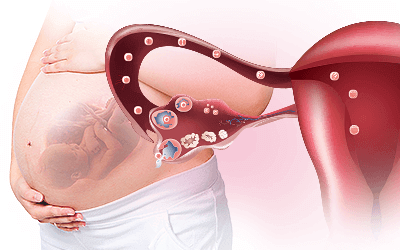
Pregnancy can be even more awe-inspiring if the complexity of conception, gestation, and fetal development are considered. The timing, the speed of the sperm, and the balance of hormones must all compound to create a situation friendly to the fertilization of an egg. And that's just conception! Then the baby has to grow healthy for a solid 40 weeks.
Progesterone has many duties when it comes to women's reproductive health, not only in maintaining normal menstruation before or between pregnancies, but also aiding in fetal development. Read on to learn more about the role of progesterone during pregnancy.
What Is the Function of Progesterone during Pregnancy?
- Progesterone protects the uterus by creating a thick, endometrial lining when levels are high. When a woman does not become pregnant during ovulation, progesterone levels drop, the lining is shed, and a woman experiences menstruation. If a woman gets pregnant, progesterone levels should remain high.
- During pregnancy, high progesterone levels tell the cervix to create a mucus plug that maintains the necessary liquids inside the uterus, but keeps harmful bacteria from entering.
- Progesterone also signals time for delivery. When it is time for the baby to be born, progesterone levels will drop, causing the mucus plug to disintegrate and the cervix to open.
Do Low Progesterone Levels during Pregnancy Mean I'll Have a Miscarriage?

Women with low levels of progesterone are at risk for a miscarriage, particularly during the earliest part of the pregnancy. Progesterone is derived from the corpus luteum, a small follicle on the ovary. After the initial stimulation of the production of progesterone, enough should be made to protect the fetus, but sometimes this does not occur and the result could be a miscarriage. However, there are steps you can take to raise your progesterone levels once you have become aware that they are deficient.
Are Progesterone Supplements during Pregnancy Available?
Progesterone supplements are available in many forms: creams, injections, and vaginal suppositories to name a few. However, while these supplements are often prescribed, the effectiveness has yet to have been demonstrated.
For More Information
Talk to your doctor about the role of progesterone in pregnancy. Don't let standardized numbers indicating where levels of progesterone should be at a certain point during pregnancy scare you; every woman and every pregnancy is different. However, you should be doing all you can by making healthy lifestyle choices to keep your progesterone levels raised during pregnancy. To learn more about how you can regulate progesterone levels with exercise and diet, follow this link.

